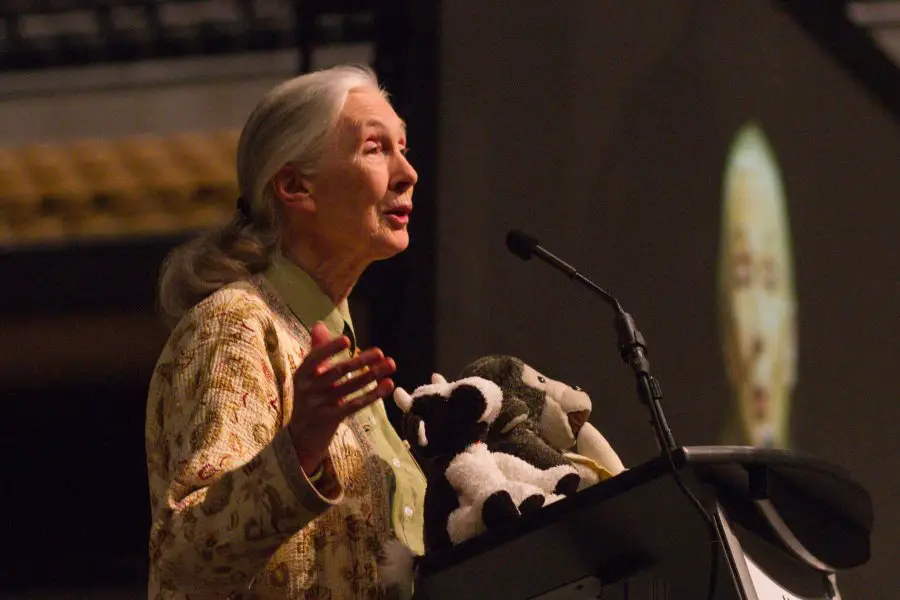Ban Wildlife Trade, End Human Greed, Jane Goodall Pleads
Tags: News

Legendary conservationist Dr Jane Goodall has warned that humans need to change our ways and ban wildlife trading, or risk facing more deadly diseases like the coronavirus.
“The awful thing is that this has been predicted. People knew it was coming, they talked about it but nobody did anything,” Goodall told The Independent.
It’s a global challenge we’re facing and Dr Goodall has called on governments and individuals across the world to ‘create legislation to protect wildlife, end illegal trafficking, ban trafficking across national borders, and ban sales, especially online’.
The 86-year-old is most famous for her documentation of chimpanzees in Tanzania in the 1960’s.
As National Geographic have put it, she is ‘a woman whose chimpanzee research challenged the male-dominated scientific consensus of her time and revolutionized our understanding of the natural world’.
Zoonotic diseases blamed for nearly 3 million deaths each year
Goodall’s focus at the moment is to create awareness about how the sale of live animals and the general destruction of the natural world are contributing towards an increase in deadly infectious diseases such as the coronavirus.
According to the National Institute of Health, zoonotic diseases – transmitted from animals to humans – result in 2.5 billion cases of human illness and 2.7 million deaths every year.
Ebola, Sars, Mers, Zika and HIV are all thought to have originated in animals.
Basically, humans’ destructive habits have caused a shrinkage in animal habitats. This has placed wildlife in increasing closer proximity to us, allowing diseases to cross between species.
“As we destroy the environment, animals are living in smaller and smaller spaces, and viruses are transferring from one animal to another,” Dr Goodall explained
“Then there’s wildlife trafficking and the handling of wild animals. They are kept crowded together with people in the meat markets. Not just in China, but across many parts of Asia and also with the bushmeat trade in Africa.
“This is where a virus gets the opportunity to jump from animals into people, and that’s what happened with Covid-19.”
Simply put, greed is causing our own downfall.
“We have moved into this destructive and greedy period of human history where we are destroying the environment and putting economic growth ahead of environmental protections, even though we are thus destroying the future for our own children,” Goodall lamented.
“Now we see this resulting in this current pandemic, which is having a horrific effect on the planet.”
Read more: Blame Humans For Coronavirus Crisis, Not Animals, Says U.N Environment Boss
Our relationship with wild animals is not the only concern
She also cautioned about the threat from farm animals, such as cows, sheep, pigs and chickens for example.
“Some of these epidemics have started with viruses jumping from domestic animals in awful intensive farms, where the conditions are horrendous, with crowding and poor hygiene. It’s not just wildlife, it’s the way that we treat our domestic animals, too.”
She also cautioned against the threat of corruption.
Viable alternative solutions needed
While calling for a ban on wildlife trade, Goodall also recognizes that some of the people involved do it simply to put food on their tables. There are many living in impoverished situations have little other option for an income.
To try address this, the Jane Goodall Institute has implemented a program called Tacare. Its aim is to find alternative ways for people to make a living and to provide them with the tools do that that.
Goodall explains: “There’s a microcredit program where groups, mostly women, can take out tiny loans to buy a few chickens and sell the eggs or have a tree nursery and sell the saplings, for example.
“It’s what people want, not what we impose upon them. The only criteria is that it’s got to be environmentally sustainable.”
Ultimately, she’s hoping that the shockwaves caused by the coronavirus and the way our daily lives have been impacted, will be the catalyst for change.
“What I’m hoping is because of the shutdown worldwide, many places are now seeing unpolluted air. I think a lot of people living in the cities have never known what it’s like and now they’ve got experience.
“I’m hoping that there will be a groundswell of people who are so horrified at the thought of going back to polluted skies that the sheer numbers will force governments to change their policies.
In concluding, Goodall said: “We have to get the message out that we’ve got to change but let’s have hope that we’re going to come out of this better people. We have to push our politicians in the right direction that we want.”
Image credit: Mark Schierbecker
Leave Comment: